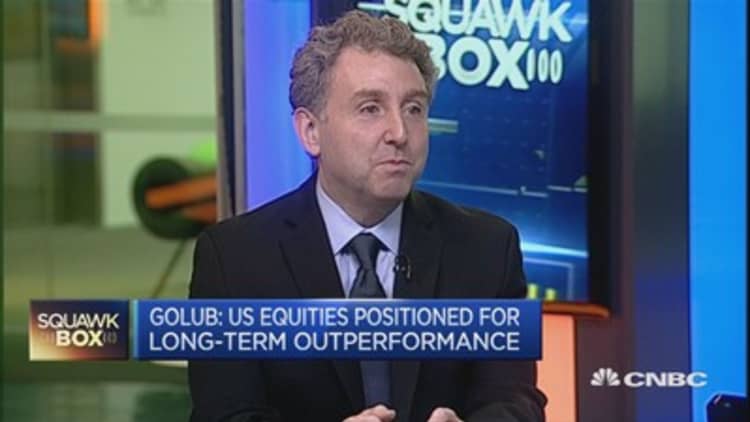
U.S. stock markets are set to outperform their peers in a time of dwindling global growth, according to one Wall Street strategist, who is urging clients to buy health care stocks that have exposure to the country's health insurance reforms.
"This market isn't feeling stressed at the corners...valuations now leave me feeling very comfortable," Jonathan Golub, chief U.S. market strategist at RBC Capital Markets, told CNBC Wednesday.
"I think that investors underestimate the power of earnings and how wonderful a job corporate management in the U.S. and the rest of the developed world is doing at delivering bottom line."
Golub recommended investors look at health care stocks and brand new technology firms.
He stressed that innovative drug companies and the biotechnology sector should perform well, as would "plays on Obamacare." Obamacare is the colloquial term for the U.S. Affordable Care Act, the law crafted by President Barack Obama to give more Americans access to health insurance.
Golub, who focuses on the U.S. , rated U.S. equities as "outperformance" in a research note this week. He believes that inflation will remain muted, potentially leading to further accommodative central bank policy.
He also believes that U.S. companies will continue to buy back their own stock, leading to further stock market gains in a bull market that has run for around six years.
On Wednesday, Golub gave this earning season's better-than-expected profits as grounds for optimism, even though turnover in corporate America might remain weak.
"I think the economy is showing that kind of vibrancy," he told CNBC.
So far, 76 percent of companies in the S&P 500 have reported second-quarter earnings above estimates, research firm Factset said in its weekly report last Friday. It also stated that the benchmark was trading at 16.7 times its forward estimates—an important metric often used to gauge the attractiveness of equity indexes. This is above both its 5-year and 10-year averages.
The S&P 500 has only risen 1.7 percent so far in 2015, but has rallied by over 200 percent since the depths of the global financial crisis in March 2009.
Nonetheless, Golub's optimism is in stark contrast to other analysts, who have voiced concerns about hefty valuations. Stewart Richardson, CIO of RMG Wealth Management, responded directly to Golub's comments, saying that there was some cause for concern.
"When you look at long-term valuation metrics, they are showing the market to be extremely expensive," he told CNBC on Wednesday.
Richardson said that triggers that could cause U.S. stocks to fall included stress in emerging markets. He highlighted that investors should be willing to "take that risk" before buying U.S. equities.


